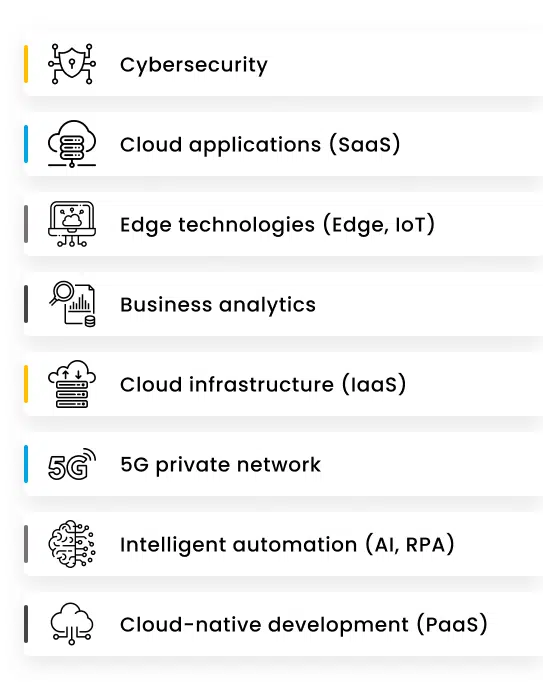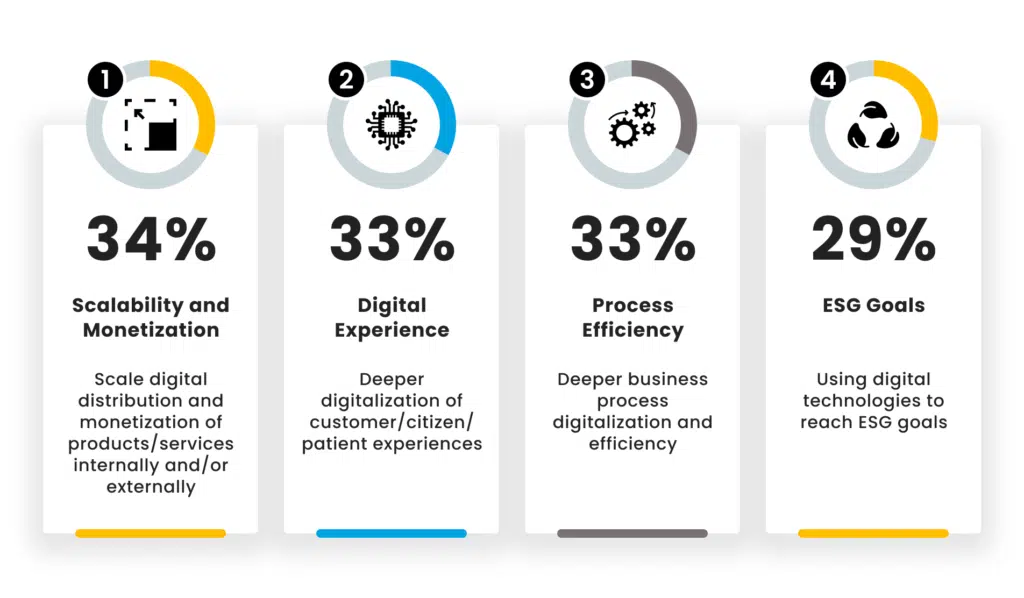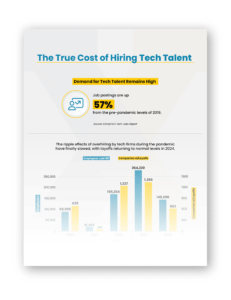In brief:
- Digital transformation efforts, if implemented correctly, can yield unprecedented levels of efficiency, productivity, and profitability.
- Across industries, digital transformation can help organizations gain a competitive advantage and future-proof operations.
- Digital transformation is a journey, not a destination and to ensure success, organizations must start small, ensure leadership buy-in, and build a strong data foundation that enables future digital growth.
Digital transformation has evolved from being a boardroom buzzword to topping the to-do list of every organization trying to keep pace with rapidly changing market conditions and technological innovations. 82% of leaders agree that “companies must invest in a digital transformation strategy or be left behind,” according to the IDC InfoBrief 2023 Insight Intelligent Technology Report.
While digital transformation can be challenging to pull off, if done right, it opens a plethora of opportunities for organizations to achieve unprecedented levels of efficiency, productivity, and profitability.
The digital transformation roadmap for every organization can look different, depending on their current stage of technology adoption and the end goals they are trying to achieve with the transformation. Digital transformation also looks different across industries, as they are all at different stages of digital adoption. However, it always involves meshing several technologies and tactical measures together to create a cohesive business strategy, including analytics, intelligent automation, cloud infrastructure solutions, business intelligence, and outsourcing.
In this blog, we’ll explore how digital transformation initiatives have emerged as a game-changer, spotlighting the key benefits, industry applications, and digital transformation strategies for driving success.

Technologies Essential for Digital Transformation
Why Digital Transformation is a Game-Changer
The benefits of digital transformation cannot be overstated. From helping organizations improve specific aspects (like customer experience at IKEA and Disney) to aiding a complete turnaround of their business (think LEGO, which went from near bankruptcy to being a successful digital-focused business), the potential of digital transformation is limitless.
Below are some of the major benefits of digital transformation:
1. Increased productivity:
Digital transformation helps organizations automate tasks, streamline processes, and improve collaboration. By adopting the right technologies along with strategic initiatives such as outsourcing, organizations can achieve significant productivity gains for stretched and/or understaffed functions such as IT, HR, finance and accounting, as it frees up resources to focus on more strategic initiatives.
2. Drive scalability and monetization:
Cloud computing helps businesses easily expand their operations without large upfront investments, helping them to scale rapidly to handle increased workloads, grow customer bases, and swiftly adapt to market changes. The vast amounts of data generated in-house and collected from customers and market trend insights can also be monetized by intelligent document processing, data analytics, and AI-powered algorithms to extract actionable insights and personalize digital business offerings based on individual customer preferences and behavior.
3. Improved customer service:
While self-service options and chatbots have been in use for customer support for some time, they have not been very successful due to their limited capabilities and frequent need for manual intervention. AI-powered chatbots and real-time support can provide faster and better quality resolutions and personalized experiences, leading to increased customer satisfaction and loyalty.
4. Reduced costs:
Automating tasks, consolidating systems, and optimizing processes for functions can reduce costs significantly across a wide range of functions including IT, HR, and finance, freeing up budget for other important initiatives.
5. Enhanced security:
Amid a growing threat landscape, digital tools help organizations adopt more robust security measures such as proactive and real-time monitoring, AI-powered threat detection and trend analysis, identity and access management, and security automation and orchestration to enable various security tools to work together seamlessly.
6. Improved decision-making and agility:
For too long, organizations have struggled to leverage the data and intelligence produced in-house to aid business decision-making. Digital transformation makes this possible, making relevant and real-time data available via data analytics to help different functions align in decision-making.
Nearshore vs. Offshore: Navigating the Hidden Hassles of Outsourcing to Asia

This can help organizations make more informed decisions to enhance operations, restructure processes as required, and boost customer service and satisfaction by identifying trends, and spotting problems early and proactively. This can also help companies pivot and course-correct quickly on business growth strategies and respond to new market opportunities.
7. Drives Sustainability:
Organizations of all sizes are committing to environmental, social, and corporate governance (ESG) goals to help them grow sustainably and with a positive impact on the planet and society. Digital transformation can put them on the right path to achieving their ESG targets, for instance, cloud computing reduces the need for organizations to maintain servers and related infrastructure, helping cut energy consumption and carbon footprint.

Main reasons for organizations investing in digital transformation (Source: IDC InfoBrief: 2023 Insight Intelligent Technology Report)
Key Industry Applications
Industries today are facing multiple challenges, many of which can be traced to the lackluster or piecemeal adoption of digital solutions and hence, the failure to fully realize the benefits of digital transformation. Below we discuss the most relevant benefits that industries can gain from implementing enterprise digital transformation:
Retail & Consumer Goods

Rapid digitalization has left retail and consumer goods companies struggling to keep up with changing consumer preferences for what, where, and how they want to purchase. The benefits of digital transformation include seamless omnichannel integration, AI-powered chatbots for customer service, virtual store audits, and merchandising decisions driven by advanced analytics, all of which enhance customer experience, optimize operations, and drive sales growth.
Financial Services

Facing growing competition from digital-first financial service providers, traditional banking and insurance service providers are now expected to provide seamless online and offline services to enhance customer experience, even while they grapple with growing fraud and data security concerns.
Digital transformation facilitates advanced analytics, reduced risk exposure, fraud detection systems, and AI-powered customer support, enhancing customer satisfaction and operational efficiency.
Healthcare

The pandemic revealed the immense pressure that our healthcare systems are facing, particularly for improving service quality and volume amid tighter budgets, stricter regulations, and workforce shortages. Digital transformation benefits healthcare providers by enhancing patient care through revenue cycle management solutions which help streamline and optimize end-to-end patient service processes while helping healthcare workers focus on providing quality care.
Intelligent automation, particularly through RPA (Robotic Process Automation) can bring multiple benefits: reducing cycle times by automating processes such as insurance verification and pre-authorization, making accounts payable more efficient by automating invoice processing, etc.
Technology & SaaS

Several advancements in this sector can be directly tied to the benefits of digital transformation. AI-powered predictive analytics aid in customer insights and product development, while cloud computing ensures scalable and cost-effective infrastructure. Automation of customer support through chatbots enhances user experiences, and data-driven decision-making optimizes business strategies. Subscription-based SaaS business models, which revolutionized how software was delivered to customers, are now leveraging data analytics to refine offerings and improve customer retention.
Private Equity

This sector has traditionally been averse to adopting new digital technology due to the highly confidential nature of its operations and focus on relationships. Advanced data analytics and AI-driven algorithms can aid private equity firms in identifying investment opportunities by analyzing market trends and financial data, while predictive analytics enable better risk assessment and portfolio management. Enhanced cybersecurity measures safeguard sensitive financial information, while automation streamlines administrative tasks, optimizing internal processes.
Restaurants & Hospitality

Still recovering from the huge setback precipitated by the pandemic, this industry has a huge scope for reducing costs and improving growth. Adoption of robust cloud architecture and Cloud Managed Services can provide scalable infrastructure at a lower cost, dedicated 24x7x365 help desk support, and operational maturity to help clients focus on innovation and revenue-generating activities. Advanced analytics provide real-time and in-depth insights into sales, foot traffic, brand quality, and customer preferences, enabling optimized promotions and rapid identification of growth opportunities as well as declining markets.
Manufacturing & Logistics

Building supply chain agility is one of the major issues faced by this industry, and a digital business transformation can be a big part of solving that. Automation and robotics streamline production processes, increasing output and maintaining quality consistency. Advanced data analytics and AI-driven predictive maintenance enhance equipment efficiency and reduce downtime, while blockchain technology ensures transparency and traceability in the supply chain, enhancing product authenticity and compliance.
How to Get Started with Digital Transformation
As evidenced above, there is a clear business case for implementing digital transformation across industries, and several organizations have made significant digital investments. However, the rate of failure has been abnormally high. The rate of digital transformations failing to meet their original objectives ranges between 70% and 95%, Harvard Business Review said in 2022, citing various studies from academics, consultants, and analysts. Gartner found that the digital transformation journey is taking larger enterprises especially at least twice as long and costing twice as much as they originally anticipated.
Below we explore some imperatives that organizations need to keep in mind to ensure success:
- Start with a clear vision: What do you want to achieve with digital transformation? Once you have a clear vision, start to develop a plan.
- Involve all stakeholders: A successful digital transformation is a team effort. Make sure that all stakeholders are involved in the planning and execution of the transformation.
- Start small: Don’t try to do too much too soon. Start with a few small projects that you can quickly implement and achieve results. Learn and apply lessons learned to the next initiative.
- Be patient: Digital transformation is a journey, not a destination. It takes time to implement and realize benefits. More importantly, the organization will need to continue to evolve and adapt as new technologies emerge and new business challenges arise.
- Create a culture of change: Digital transformation is not just about technology. It is also about culture. Organizations need to create a culture that is supportive of change and innovation. This means empowering employees to experiment with new technologies and solutions.
- Ensure leadership buy-in: Digital transformation gets nowhere without leadership buy-in. Those driving digital transformation need to be able to articulate their vision to the C-suite and get their buy-in for digital transformation, to ensure they can navigate any internal challenges, such as resistance to change and budget constraints.
- Build a strong data foundation: Data is the fuel that drives digital transformation. IT organizations need to have a strong data foundation in order to make informed decisions and to improve their business operations. This means collecting, storing, and analyzing data in a way that is secure and compliant.
- Cross-functional cooperation: Digital transformation benefits cannot be achieved by IT organizations working in isolation. They need to partner with other departments within their organization, as well as with external partners, such as technology vendors and consulting firms. This will help them to share knowledge and resources, and to accelerate the pace of digital transformation.
Digital transformation is essential for businesses looking to realize the benefits of automation, efficiency, and reduced operating costs. With the help of an experienced digital transformation partner, businesses can undertake a successful transformation journey and build a solid foundation for success.





